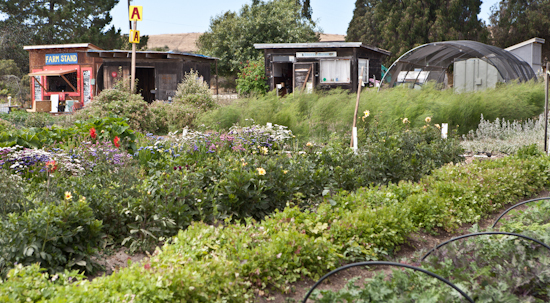The Right Livelihood Award (RLA), also known as the “Alternative Nobel Prize,” is used to award the tremendous work of people striving to better the world. Since UC Santa Cruz Kresge College is a Right Livelihood College (RLC), a direct link between academics and the work of laureates, UC Santa Cruz was fortunate enough to have scholar Helena Norberg-Hodge come speak.
Helena Norberg-Hodge, an activist, director, writer and a honorable Laureate of the Right Livelihood Award, gave a thought provoking speech on ecological well-being and the limitations in our economic system at the University of California Santa Cruz on the evening of Monday, November 6th, 2017.
“The dominant system of economic globalization is limited,” spoke Helena to a crowd of 65 students, faculty and members of the local community at the Kresge Seminar Room.
During Helena's lecture, "The Economics of Happiness," she explained how the system pushes citizens to reach standards of societal success through economic values rather than their own standards of individualized success. The standards overstrain individuals rather than challenge them.
Helena encouraged her audience to consider the corrupt system of economic globalization in comparison to Gaian Economics. Gaian Economics emphasizes how inorganic and organic organisms coexist on earth. In the diverse world we live in, we need to recognize that individuals need to set their own standards for success. If a national system sets standards for success outcomes, the individual person or community may have a hard time expressing its uniqueness.
“I see [in the people of Ladakh] an incredible joy and equanimity that comes from deep community relationships and intergenerational communities,” Helena explained.
We can promote ecological well-being in our system by connecting nature and a sense of pride for our community relations.
Helena noticed how the people of Ladakh did not worry about the advancement of other communities world-wide in technology or other westernized concepts. As Helena is an expert on economic localization, the idea of shifting economic values away from an over-dependence on the global economy, she notes how important it for smaller nations, such as the Ladakh people, to focus on the wellbeing of their own community, rather than worry about supporting other nations in the world economy.
Helena expressed how important it is for cultures to co-exist. If we all create for ourselves opportunities to be open-minded with people of different backgrounds and travel to meet people in unfamiliar places, we can gain a better understanding of the human experience.

The following week Common Ground Center hosted a World Cafe conversation to provide an opportunity for participants to engage in dialogue about the topics Helena brought up, titled the
“Economics of Happiness Cafe.” Attendees responded by saying that this was “the best talk I’ve ever been to” and that “the culture of Santa Cruz is great for Right Livelihood College to thrive.”
Many attendees brainstormed Helena’s ideas together at the World Cafe, through interactive tablecloths, on how we can better appreciate the community we live in.
Overall, Helena’s speech encouraged members of the community to come together and create a discussion on how they can implement change in the community they call home.
Common Ground regularly hosts guest speakers, including Winona LaDuke on January 25th at 7:10PM at Kresge Town Hall.
Finally, from May 15-20th, UC Santa Cruz will be hosting the Right Livelihood Conference for North America so if you want to meet Helena and other inspirational laureates, stay tuned for this upcoming event. Stay tuned!









